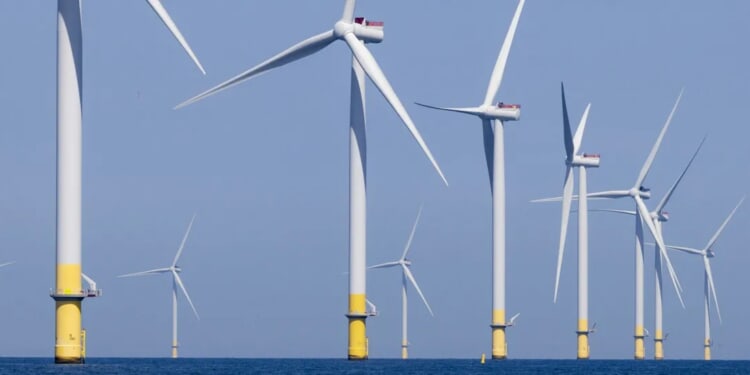Is the push and pull in the energy and climate regulatory environment hurting the ability for companies to finance and complete energy projects in the United States? The head of Shell in the United States, Colette Hirstius, said she believes it is in a recent interview.
“I think uncertainty in the regulatory environment is very damaging,” Hirstius said, adding, “However far the pendulum swings one way, it’s likely that it’s going to swing just as far the other way.”
Hirstius was addressing the moves made by the Trump administration to slow the progress of the offshore wind industry, which was the crown jewel of the Biden administration’s headlong rush into a government-subsidized energy transition. Trump’s regulators, led by Secretary of Interior Doug Burgum and Energy Secretary Chris Wright, have taken a series of actions in compliance with executive orders signed by Trump since January to halt several projects that were under construction, roll back federal subsidies, and review permits they believe were hastily issued in non-compliance with legally required processes.
“I certainly would like to see those [offshore wind] projects that have been permitted in the past continue to be developed,” Hirstius said. (RELATED: Biden Admin Streamlined Path For Offshore Wind Boondoggles Despite Internal Red Flags)
That hope seems discordant, coming as it does amid Shell’s ongoing effort to step back from offshore wind and refocus more of its capital budget back to its core oil and gas business following years of unprofitable ventures into renewables. It also seems fair to point out that the political pendulum about which Hirstius warns already swung wildly in favor of offshore wind and other wind and solar projects in the Biden administration. It is odd that Shell only now decides to roll out that particular warning.
Shell was pulling back from its major offshore wind investments while Trump was still fighting off efforts by an array of Democratic prosecutors to put him in prison. In June 2023, for example, the company announced its intent to offload its 50% share in the Southcoast project offshore Connecticut amid Biden era high inflation and supply chain challenges that were already rocking the industry at the time. Nine months later, Shell sold the interest to another party.
The company announced last December that it was “stepping back from new offshore wind investments” as part of a company-wide review implemented by then-new CEO Wael Sawan in mid-2023. A month later, it cancelled its interest in the Atlantic Shores project, writing off $1 billion in investments in the process. Shell’s ventures into the U.S. offshore wind arena had run head-long into economic reality long before the second Trump presidency came along.
That Atlantic Shores project has become an item of special interest inside the Interior Department’s Bureau of Ocean Energy Management (BOEM) in recent days. In a court filing last Friday, BOEM Deputy Director Matthew Giacona said the Bureau plans to conduct a full review of the process that went into approving Atlantic Shores during the Biden presidency. He also said the review would likely expand to other offshore wind projects given the administration’s concerns that Biden’s regulators failed to properly assess the true environmental impacts these major industrial installations create.
In addition to that, the Daily Caller’s Audrey Streb reported on Monday that Biden regulators gave the go-ahead to some of these offshore projects despite internal concerns expressed as early as 2021 that granting long delays in their decommissioning processes “increases risk to the federal taxpayer.” Offshore developers are normally required to provide financial assurance to pre-fund such costs, but big Danish developer Orsted and others were requesting delays as long as 15 years in that requirement to make their project economics work.
Hirstius’s concerns about regulation are absolutely valid: Having such certainty is a crucial element for any company to be able to plan its future business endeavors. But every presidency has a duty to ensure that actions by prior administrations meet the mandates of prevailing laws. It has long been feared that the Biden regulators cut important corners related to environmental and marine mammal protections to speed some offshore wind projects through the process.
As this current review process plays itself out, Shell might well find itself glad it cut its losses in this failing offshore wind sector when it did.
David Blackmon is an energy writer and consultant based in Texas. He spent 40 years in the oil and gas business, where he specialized in public policy and communications.
The views and opinions expressed in this commentary are those of the author and do not reflect the official position of the Daily Caller News Foundation.
All content created by the Daily Caller News Foundation, an independent and nonpartisan newswire service, is available without charge to any legitimate news publisher that can provide a large audience. All republished articles must include our logo, our reporter’s byline and their DCNF affiliation. For any questions about our guidelines or partnering with us, please contact licensing@dailycallernewsfoundation.org.











![Florida Officer Shot Twice in the Face During Service Call; Suspect Killed [WATCH]](https://www.right2024.com/wp-content/uploads/2025/12/Inmate-Escapes-Atlanta-Hospital-After-Suicide-Attempt-Steals-SUV-Handgun-350x250.jpg)





